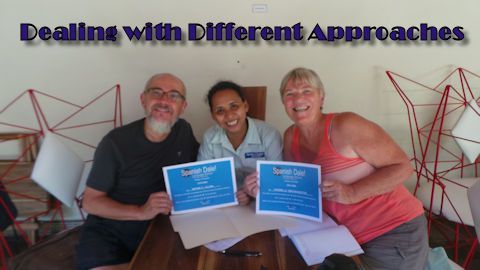Dealing with Different Approaches
Synopsis: Dealing with Different Approaches — differences are in our heads — they’re not a part of the situation
Apologies for no article last week. Darbella and I are on a road trip to Nicaragua, for Spanish classes and to renew our passports. We return to Costa Rica tomorrow!

We’ve once again met interesting people on our travels, and have had a blast in Granada, Nicaragua. The country is definitely different from Costa Rica, and Granada is a major city, so we’ve been dodging traffic while surrounded by “muchas personas.”
We’ve had a bit of a discussion about travelling and about flexibility.
I think Flexibility is the key to doing what we do… moving into a community for long stretches… in this case, living with a Nica family while taking Spanish lessons. As opposed to vacations, which a lot of people take… and then either stay at resorts, or gripe about how “It’s not like this at home.”
I guess this is a lot like Zen, and of course Zen makes no sense to some people. All that “nothing means anything, so just be with it” stuff.
I’m endlessly fascinated with differences.
One of the people also staying with our family is a woman who is entering her second year of a Masters in social work back in the States. We’ve had interesting discussions over meals about this topic… how Flexibility and the willingness to be open to the experience at hand is key to working through what initially appear to be differences.
This fits with our endless articles concerning how, even with couples living in the same space, there is never even a similar experience.
Dar and I also notice this as we study Spanish. Her skill set differs from mine, despite our having been in all the same classes.
This can be disconcerting, especially when people forget that their way of seeing things is not universal. It is all too easy to get caught in being right, as opposed to seeing clearly.
For example, one day we were conjugation irregular verbs in the present tense. Fun, fun, fun. The teacher tossed out poder, which means could. My mind blanked, and I couldn’t remember what it meant or how to conjugate it.
Dar blazed right through it, and, seeing ne sitting there staring into the middle distance, said, “You know this,” which landed with a thud.
She then said, “puedo” which is first person.
Boom. I was into, “I’m stupid, this is terrible, I’ll never get this.” Then I went to “Dar should have said…” along with me getting quiet and grumpy. So much so that I can’t even remember how I conjugated the verb (puedo, puedes, puede, podemos, pueden, if you’re curious 



